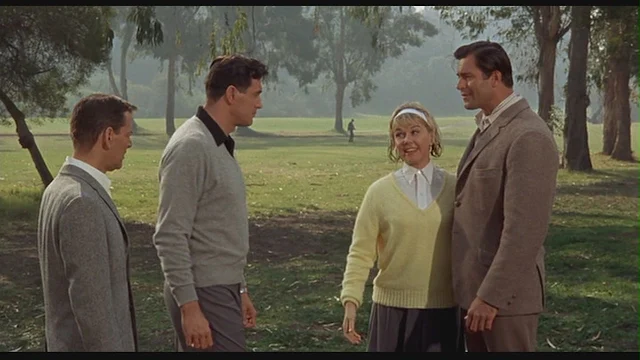 |
| Doris Day and Gordon MacRae in On Moonlight Bay |
Cast: Doris Day, Gordon MacRae, Billy Gray, Leon Ames, Rosemary DeCamp, Jack Smith, Mary Wickes, Ellen Corby, Sig Arno, Jeffrey Stevens, Eddie Marr, Henry East. Screenplay: Jack Rose, Melville Shavelson, based on stories by Booth Tarkington. Cinematography: Ernest Haller. Art direction: Douglas Bacon. Film editing: Thomas Reilly. Music: Max Steiner.
Leon Ames must have felt right at home playing the paterfamilias of a Midwestern household in 1917 in the Warner Bros. musical On Moonlight Bay: It was the same role he had played in 1944, when he was the paterfamilias of a St. Louis household in 1904 in Vincente Minnelli's MGM musical Meet Me in St. Louis. In both films he comes under fire for making the household move, upsetting his wife (Rosemary DeCamp in the former movie, Mary Astor in the latter), his daughter (Doris Day/Judy Garland), his bratty kid (Billy Gray/Margaret O'Brien), and even the family servant (Mary Wickes/Marjorie Main). In both films, the daughter falls in love with the boy next door (Gordon MacRae/Tom Drake). There's even a big scene set at Christmas in both movies. Granted, On Moonlight Bay suffers from comparison with Meet Me in St. Louis. For one thing, the songs in the latter are better, and Garland brings a note of heartbreak to the film that Day can't quite match. But the Warners movie gets a little life from a screenplay based on the Penrod stories by Booth Tarkington, a writer not much read anymore but who inspired two classic movies, Alice Adams (George Stevens, 1935) and The Magnificent Ambersons (Orson Welles, 1942). The stories, about the misadventures of an 11-year-old boy, clearly inspired On Moonlight Bay's subplot about Wesley Winfield (Gray), kid brother to Marjorie Winfield (Day). Wesley is a scamp who purloins one of Marjorie's letters to her boyfriend, William Sherman (MacRae), and tries to pass it off in English class as his own composition. He torments Hubert Wakely (Jack Smith), who tries to court Marjorie, and he even manages to convince his teacher, Miss Stevens (Ellen Corby), that the reason he falls asleep in class is that his father is a drunkard who abuses his mother and sister. Much of this stuff is clumsily directed, but it's an effective enough distraction from the rather routine romance of Marjorie and William and from the tepid musical numbers, set mostly to old parlor ballads and turn-of-the-century love songs like the one that gives the film its title. Day is in sweet voice as usual, but her role in the movie and the songs she's asked to sing don't give her much to do, and she doesn't really have much chemistry with MacRae. Nevertheless, On Moonlight Bay was popular enough that it inspired a sequel, By the Light of the Silvery Moon (David Butler, 1953), that reunited most of the cast.




.jpg)